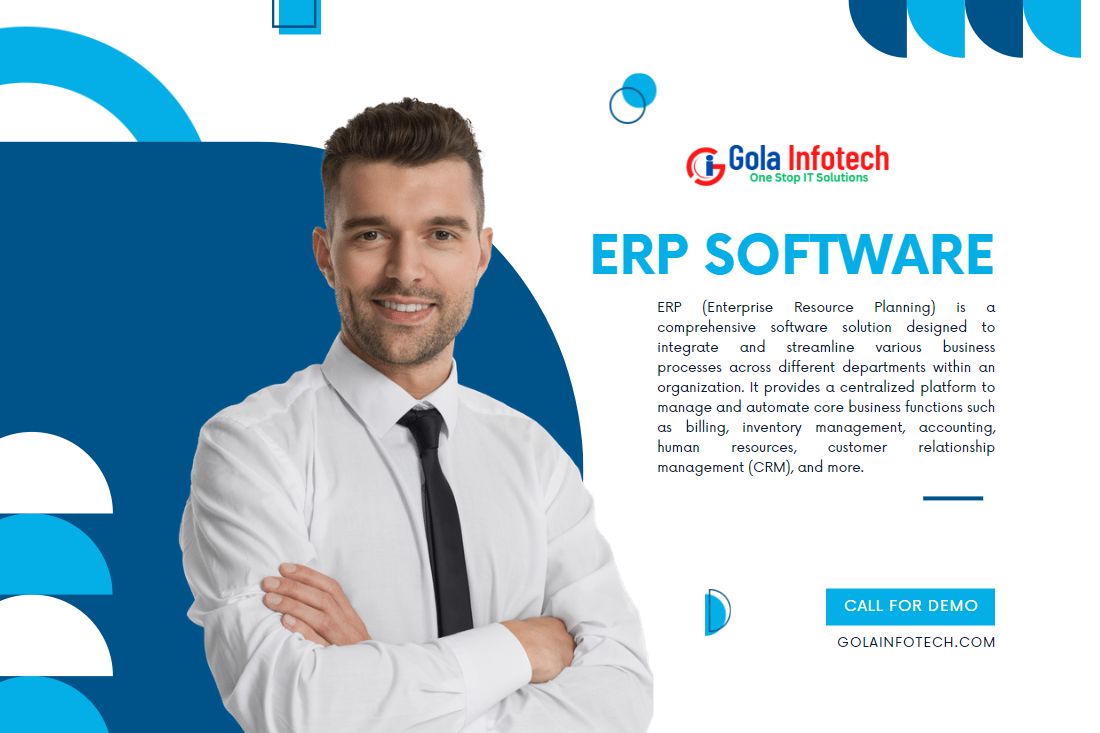ERP SOFTWARE

ERP (Enterprise Resource Planning) is a comprehensive software solution designed to integrate and streamline various business processes across different departments within an organization. It provides a centralized platform to manage and automate core business functions such as billing, inventory management, accounting, human resources, customer relationship management (CRM), and more.
Billing software is an essential component of an ERP system. It enables businesses to efficiently manage their billing processes, generate accurate invoices, and track payments. With billing software integrated into an ERP system, businesses can automate billing workflows, set up recurring billing cycles, handle complex pricing structures, and generate customized invoices. This ensures timely and accurate invoicing, improves cash flow management, and enhances customer satisfaction.
Inventory management software is another critical aspect of ERP. It enables businesses to effectively monitor and control their inventory levels, track stock movements, and optimize supply chain operations. With inventory management software integrated into an ERP system, businesses can automate inventory tracking, streamline procurement processes, manage multiple warehouses, set up reorder points, and generate real-time reports on inventory status. This helps reduce stock-outs, minimize carrying costs, improve order fulfillment, and enhance overall operational efficiency.
The integration of ERP, billing, and inventory management software offers several benefits to businesses:
Improved Efficiency: By automating and streamlining processes, businesses can reduce manual efforts, eliminate data duplication, and minimize errors. This leads to improved operational efficiency and productivity across various departments.
Enhanced Visibility: An integrated ERP system provides real-time visibility into business processes, enabling stakeholders to access accurate and up-to-date information. This helps in making informed decisions, identifying bottlenecks, and responding quickly to changing market dynamics.
Cost Savings: By optimizing inventory levels, minimizing stock-outs, and eliminating manual billing processes, businesses can achieve cost savings. Additionally, centralized data management reduces the need for multiple software systems and manual data entry, resulting in lower IT costs.
Improved Customer Satisfaction: With an integrated ERP system, businesses can deliver faster order processing, accurate invoicing, and timely delivery. This enhances customer satisfaction, strengthens customer relationships, and improves overall service levels.
Regulatory Compliance: ERP software often includes features to ensure compliance with legal and financial regulations. By automating compliance processes and generating accurate reports, businesses can reduce the risk of non-compliance and associated penalties.
In summary, ERP software, along with integrated billing and inventory management modules, plays a crucial role in optimizing business operations, improving efficiency, and driving growth. It provides businesses with a unified platform to manage their core processes, streamline workflows, and gain valuable insights for strategic decision-making. Whether it's managing billing cycles, optimizing inventory levels, or enhancing customer satisfaction, an ERP system with billing and inventory management capabilities is a valuable asset for any modern organization.
 English
English
 हिंदी भाषा
हिंदी भाषा
